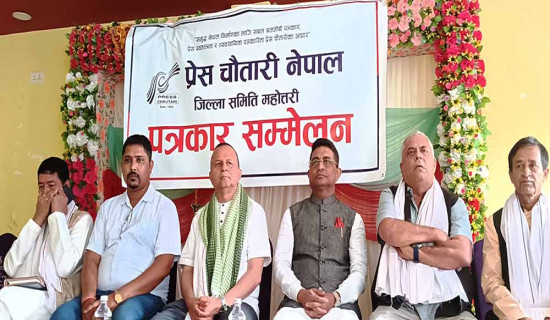- Friday, 22 August 2025
Baghmukhi Chulesi on verge of disappearance
BY OUR CORRESPONDENT,Pyuthan, Feb. 13: Pyuthani Baghmukhi Chulesi, traditional blade on a metal body of tiger used for cutting vegetables and meat, is about to go extinct after the knowledge of making the Chulesi could not be handed to the new generation.
Chulesi is used in most of the hilly regions of Nepal. But, in Pyuthan we can find especial kind of Chulesi named Baghmukhi Chulesi meaning tiger-faced blade. A sharp metal blade is attached to the tiger-face-shaped base. For this, clay from Dewal of forest in Pyuthan is first shaped like a tiger. After that it is coated with wax and forged into a metal body and a blade is attached to it.
Dalit community in Budhachaur of Mallarani Rural Municipality-4 has been making such Chulesi since the ancient time. Jokh Bahadur BK, an ironsmith, informed that Baghmukhi Chulesi could only be found there.
Jokh Bahadur said that it needs lots of patience to forge Baghmukhi Chulesi since one should be very careful about the temperature during the process, else it would be all wasted.
It takes around a week to make one Chulesi and they would begin with only 4-5 Chulesis in one lot, he informed. Since, the procedure needs lots of effort and raw materials like wax and brass were not easily available in the local market, new generations had lost interest in this occupation, he added.
Even the local government had not shown any interest to protect and conserve this craft. Since, there were no programmes related to making Chulesi, youths had left village for the jobs. There were up to 4-6 metal smiths who could make Chulesi in the village.
Jokh Bahadur informed that he was the only one metal smith remaining in the village making Chulesi at present.
He said that although there was demand for Chulesi in the village he had not been able to supply it alone. "People like me who have already crossed sixty years are not in a state to continue this occupation," he said. "If we fail to transfer this skill to the new generation, Baghmukhi Chulesi, which is also a part of Pyuthan’s identity, would go extinct in the near future."





-square-thumb.jpg)
-original-thumb.jpg)
-square-thumb.jpg)
-square-thumb.jpg)








